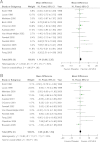Meta-analysis of long-chain polyunsaturated fatty acid supplementation of formula and infant cognition
- PMID: 22641753
- PMCID: PMC3362904
- DOI: 10.1542/peds.2011-2127
Meta-analysis of long-chain polyunsaturated fatty acid supplementation of formula and infant cognition
Abstract
Background and objective: Infant formula is supplemented with long-chain polyunsaturated fatty acids (LCPUFAs) because they are hypothesized to improve cognition. Several randomized controlled clinical trials have examined the effect of LCPUFA supplementation of infant formula on cognitive development. We conducted this meta-analysis to examine the efficacy of LCPUFA supplementation of infant formula on early cognitive development.
Methods: Two authors searched PubMed, PsychInfo, and Scopus for randomized controlled clinical trials assessing the efficacy of LCPUFA supplementation of infant formulas on cognition. Our analysis was restricted to randomized controlled clinical trials that examined the effect of LCPUFA supplementation on infant cognition using Bayley Scales of Infant Development. Our primary outcome was the weighted mean difference in Bayley Scales of Infant Development score between infants fed formula supplemented with LCPUFA compared with unsupplemented formula. We conducted secondary subgroup analyses and meta-regression to examine the effects of study sample, LCPUFA dose, and trial methodologic quality on measured efficacy of supplementation.
Results: Twelve trials involving 1802 infants met our inclusion criteria. Our meta-analysis demonstrated no significant effect of LCPUFA supplementation of formula on infant cognition. There was no significant heterogeneity or publication bias between trials. Secondary analysis failed to show any significant effect of LCPUFA dosing or prematurity status on supplementation efficacy.
Conclusions: LCPUFA supplementation of infant formulas failed to show any significant effect on improving early infant cognition. Further research is needed to determine if LCPUFA supplementation of infant formula has benefits for later cognitive development or other measures of neurodevelopment.
Figures





Comment in
-
Is the measure the message: the BSID and nutritional interventions.Pediatrics. 2012 Jun;129(6):1166-7. doi: 10.1542/peds.2012-0934. Epub 2012 May 28. Pediatrics. 2012. PMID: 22641756 Free PMC article. No abstract available.
References
-
- Grummer-Strawn LM, Scanlon KS, Fein SB. Infant feeding and feeding transitions during the first year of life. Pediatrics. 2008;122(suppl 2):S36–S42 - PubMed
-
- Kramer MS, Aboud F, Mironova E, et al. Promotion of Breastfeeding Intervention Trial (PROBIT) Study Group Breastfeeding and child cognitive development: new evidence from a large randomized trial. Arch Gen Psychiatry. 2008;65(5):578–584 - PubMed
-
- Feldman R, Eidelman AI. Direct and indirect effects of breast milk on the neurobehavioral and cognitive development of premature infants. Dev Psychobiol. 2003;43(2):109–119 - PubMed
-
- Britton JR, Britton HL, Gronwaldt V. Breastfeeding, sensitivity, and attachment. Pediatrics. 2006;118(5). Available at: www.pediatrics.org/cgi/content/full/118/5/e1436. - PubMed
-
- Furman L, Minich NM, Hack M. Breastfeeding of very low birth weight infants. J Hum Lact. 1998;14(1):29–34 - PubMed
Publication types
MeSH terms
Substances
Grants and funding
LinkOut - more resources
Full Text Sources
Medical
Miscellaneous

